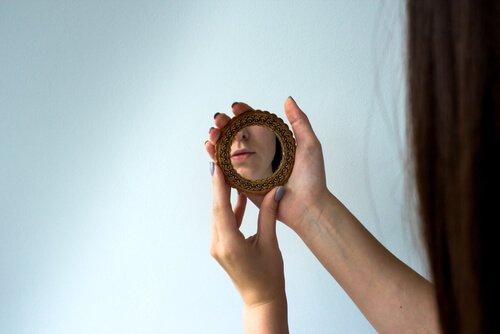The Path to Self-Knowledge Is Hard, but Worth It

At the Ancient Greek Temple of Apollo in Delphi, there’s a stone inscription that reads: Gnothi seauton. This literally means: “know yourself”. It’s a profound, timeless message about the path to self-knowledge and one you’ll find in the work of many Greek writers, especially Plato.
Self-knowledge is both the pillar and the doorway that opens up the path to self-fulfillment. It’s a process of reflection, where you learn about yourself as you go through life. Doing this helps you become aware of your strengths, weaknesses, and all the qualities in between.
What’s the Point of Self-Knowledge?
Getting to know yourself is the starting point in making decisions that will help you achieve well-being. When you know yourself, you know what makes you happy, what you need, and what you can achieve. Plus, it plays a big role in self-esteem and self-control.
Self-knowledge is also about knowing your rights, duties, and responsibilities. In a sense, it gives you a broader, more authentic portrait of yourself. Once you have that portrait of yourself, you’ll be able to reinforce your self-love.
One of the most important aspects of self-knowledge is that it’s synonymous with being less impulsive and more conscious of your thoughts, feelings, and actions. On some level, it means being more aware of the consequences of your actions and of everything you experience in life.
Taking the path to self-knowledge is a great way to adapt to your psychosocial environment and achieve self-acceptance.

What’s the Path to Self-Knowledge Like?
Although we tend to think we know ourselves well, that isn’t always the case. Knowing yourself isn’t a simple task. It could take you years, and you may never actually get all the way during your life. Your experiences change you. You’re not the same person you were a few years ago and you probably won’t be the same person you are now in the future.
We’re in a constant state of change and go through countless transformations in terms of how we think, act, and understand our own existence.
Thus, the first thing you need to do is be honest with yourself. To do that, you have to avoid the traps of self-deception and all the defense mechanisms you might be using, especially unconsciously. The goal is to learn how to analyze yourself deeply.
Stages on the path to self-knowledge
- Self-perception. A passive, but realistic and intimate observation of yourself.
- Self-observation. Analyzing your thoughts and behaviors so that you can understand why you act the way you do.
- Autobiographical memory. Looking back on all the memories you have of your life. This makes it much easier to remember the things that have happened to you.
- Self-esteem. Thinking about self-love and all the ways you build yourself up and tear yourself down. Self-knowledge can give you a kind of map that shows you how much you love yourself, which can tell you whether or not you need to invest more in that area.
- Self-concept. Basically the picture you have of yourself, based on your values.
- Self-acceptance. After the stages we mentioned above comes the time to accept yourself, look into the mirror, and see yourself as you are. That’s the only way to finish maturing and come to the end of the path to self-knowledge.
“Your purpose in life is to find your purpose and give your whole heart and soul to it.”
-Buddha-

Asking yourself important, meaningful questions is also helpful when it comes to staying on the path to self-knowledge. For example, “Who am I?” or “What are my goals?” These are vital questions that will give you important information about yourself.
Practicing mindfulness can be a great tool as well. It can help you reach states of calmness and inner peace that make it much easier to delve deep into who you really are.
As you can see, getting to know yourself isn’t a cake walk. Exploring the deepest parts of yourself and accepting who you are and who you aren’t takes time, effort, and honesty. Although these are things not everyone is willing to put in, making that investment can take you on the most fascinating journey of your life.
This text is provided for informational purposes only and does not replace consultation with a professional. If in doubt, consult your specialist.








